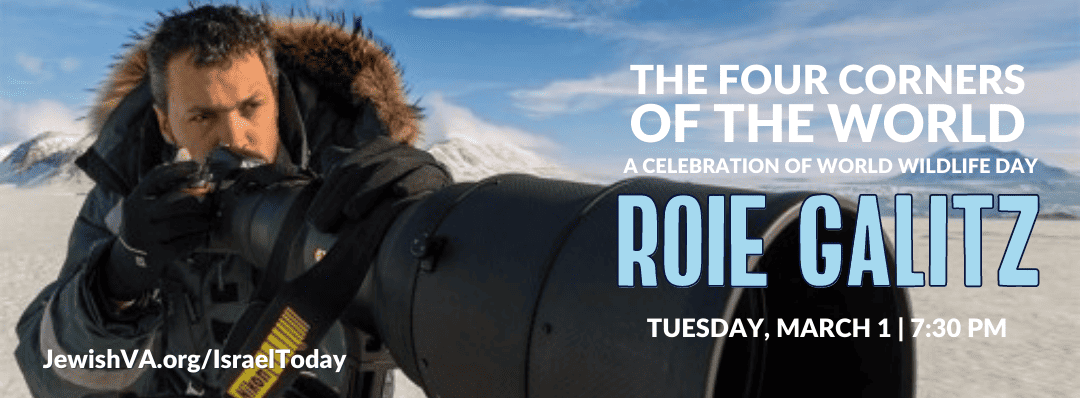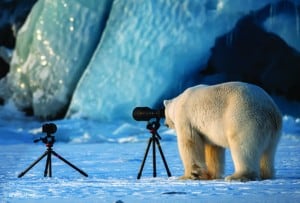Tuesday, March 1, 7:30 pm
Reba and Sam Sandler Family Campus
Free, registration required: JewishVA.org/IsraelToday
Admired for his engaging and boundary-pushing photography, Roie Galitz is equal parts passion and commitment in his pursuit to get the best shots of animals in their natural habitats. His innovative work has been featured in National Geographic, the Smithsonian Magazine and other publications that have garnered Galitz international awards and acclaim. He earned the prestigious Picture of the Year award for reportage of Science and Natural History in 2019.
Galitz will be in Tidewater to speak about his adventures as a photographer and environmental entrepreneur. His visit is part of the 11th Annual Israel Today Series, presented by United Jewish Federation of Tidewater’s Jewish Community Relations Council, Simon Family JCC, Embassy of Israel & Community Partners.
Galitz has traveled to every corner of the world and witnessed the impact of climate change. Galitz actively shares his passion for photography, adventure, and protecting the natural world. He is an Explorer member of the Explorers Club and a board member of the Israeli Nature and Heritage Foundation.
This quick interview provides some insight into Roie Galitz’s passion. It has been edited for clarity and length.
Elka Mednick: How did you decide to make photography your career?
Roie Galitz: I was a commercial photographer when I started, and did not enjoy it, so I quit photography and began working in finance. Finance wasn’t for me, so I slowly began teaching photography on the side, and found that engaging. In 2007, while I was still working in finance I opened a photography school. Once the school was stable, I quit my finance job and started a photo travel company. Then, I was able to take the time to photograph what I wanted, and start enjoying photography again. It was quite exciting to be able to pursue my passion professionally.
EM: Where have you traveled that was the most surprising?
RG: The answer for that has to be Svalbard, because I knew what to expect in Africa. However, the first time I traveled to Svalbard, which was 10 years ago, it was completely an amazing surprise! Seeing Polar Bears for the first time really changed me in a way that I became so passionate about Polar Bears, and about photography, wildlife photography, mostly about the environment. That actually got me into being an activist, and being an environmental diplomat because at that point I saw the Arctic melting so fast in front of my very eyes. Basically that’s why I joined Green Peace and became way more active in the diplomatic environmental way.
EM: Do you have a favorite place to visit? Do you have a favorite animal to photograph?
RG: Everywhere is special, and there are lots of favorites, but I’d have to say Svalbard is the most unique and it’s the least documented. There are not many photographers who have the unique access I have to Polar Bears. I’d say that this is my life’s project, so this is why I go over and over, and why the Polar Bears are my favorite animal to photograph. They’re really smart, really cute, really endangered, and I feel like it’s my mission to help save them.
EM: How do you use your corporate partners to further your goals as an environmentalist?
RG: I consult companies, and I’m really active in the diplomatic arena. I gave a talk at the United Nations, and also at the NY climate week, and I’m a board member for the Israeli National Heritage Foundation of America, so we are raising money to support the environment, because it’s all about money at the end of the day. Additionally, I am a member of the Israeli National Heritage Foundation. We are raising money to create a sea turtle hospital as well as rehabilitating the population of Oryx, Fellow Deer, native orchards, and many other animals in Israel.
EM: You’ve been to the most extreme conditions on the planet and witnessed the changes that have occurred in those places, and the threat to life in small and large ways. What can you share about the impact the change in climate has had on the natural world, and do you have any advice on what individuals can do to minimize their impact?
RG: I think that first of all the main thing we can do is reduce our environmental footprint and reduce our carbon footprint.
That means consuming less energy, minimizing the use of internal combustion engines, using less electricity, renewable sources, and eating less meat. We can also lessen our use of water, electricity, and heating to help protect the environment.
On the community level, there is a lot we can do. That means recycling more, and better than recycling is reusing, as recycle has its own huge environmental impact, so reusing is way way way better than recycling. Creating urban gardens, and good education for future generations, and help influence others on the community level.
And of course, on the national level we have to incentivize green energies, and stop subsidizing polluting industries. Think about it, it’s so unbelievable that we’re actually giving tax dollars to subsidize the very same industries that are destroying our planet. A fraction of what we’re investing in fossil fuels goes into research of clean energy. So the planet is investing over $400 billion in fossil fuel subsidizes, and about $5 billion goes into researching renewable energies, and subsidizing renewable energies. We need to stop searching for oil and gas and we have to stop fracking, and we have to stop the development of the northern silver, which is the high arctic shipping lane that is supposed to transport oil, crude oil from all over the world in the high arctic. Just imagine what would happen if we have an oil spill over there. We have to start investing in the future and not in burning our candle at both ends, literally speaking.
RSVP (required) at JewishVA.org/IsraelToday or contact Elka Mednick, assistant director, Jewish Community Relations Council of the United Jewish Federation of Tidewater, at emednick@ujft.org or 757-965-6112.


